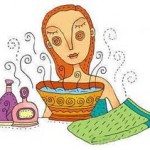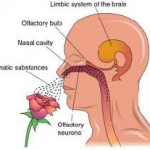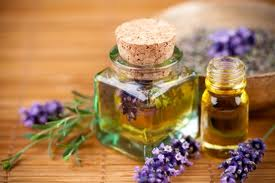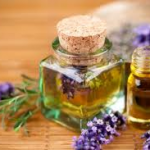Aromatherapy doesn’t just smell good, it can also benefit you in many ways. Some aromatherapy benefits that are more commonly known include:
- Relaxation and stress relief
- Mood enhancement, balance and well being
- Relief of minor discomforts
- Boosting the immune, respiratory and circulatory systems
 Aromatherapy is a great, natural complement or alternative to other health treatment options such as certain prescribed medications. But don’t throw away those prescription bottles just yet.
Aromatherapy is a great, natural complement or alternative to other health treatment options such as certain prescribed medications. But don’t throw away those prescription bottles just yet.
Aromatherapy doesn’t “cure†major illnesses but it is effective at alleviating many of the discomforts associated with them.
Essential oils are the heart of aromatherapy. They have been used to:
|
|
Â
Cherie Perez, a supervising research nurse in the Department of Genitourinary Medical Oncology, teaches a monthly aromatherapy class to answer those questions for cancer patients and caregivers undergoing treatment at M. D. Anderson Cancer Center. Perez, who first became involved with aromatherapy to help relieve the physical pain and discomfort caused by fibromyalgia, shares her professional knowledge of the basics of aromatherapy, safety precautions and interactive demonstrations in each hour-long class.
The Smell Factor
 To better understand aromatherapy benefits, it helps to know how your body processes smells.
To better understand aromatherapy benefits, it helps to know how your body processes smells.
The sense of smell is pretty powerful. In fact, the body can distinguish around 10,000 different scents! Amazing, isn’t it?
As scents are inhaled, the smell travels across the olfactory nerves located inside the nose and then up into the part of the brain that controls our moods, our memories and our ability to learn. This area is called the Limbic System and when stimulated it releases endorphins, neurotransmitters and other ‘feel-good’ chemicals.
Wow! That’s pretty scientific stuff… not to worry, in a nutshell, what all of that means is that smells have a subtle way of effecting your mind and emotions.
Just think of the way you feel when you sniff the scent from a fresh bouquet of flowers versus your reaction when you smell something not so fresh like garbage or burnt toast. A big difference right?
 FIVE OILS TO REDUCE STRESS AND RELIEVE AILMENTS
* Lavender – First used as perfume by ancient Egyptians 2,500 years ago, lavender is now used to treat insomnia, migraines and provide stress relief.
* Rosemary – This fragrant plant relieves muscle pain, low blood pressure and cold feet and hands.
* Spearmint – The oil from spearmint aids digestion and eases nausea and vomiting.
* Masculine scents – Scents such as bay laurel and ylang-ylang appeal to men for their deep scent. They also treat skin rashes, rheumatism and stomach ailments.
Essential Oil Absorption
Aromatherapy also works by absorbing essential oils into the skin and blood stream.
One of the advantages to topical application of diluted essential oils is that they can go directly to the spot where you need them the most.
 An aromatherapy massage is a great way to reap the benefits of topical application of essential oils along with the soothing therapeutic benefits of massage. There are a variety of different products and methods of diffusion to obtain the healing benefits of oils. Some oils – like lavender, ylang ylang and sandalwood can be applied directly to the skin – while others are too concentrated and need to be diluted into carriers such as massage oils, bath soaps and lotions. Most typically, Perez advises patients to put a few drops of oil, or a combination of oils onto a handkerchief and “fan themselves like Scarlett O’Hara.” Burning oils or incense is not recommended because most are poorly constructed and give off unhealthy fumes and soot.
An aromatherapy massage is a great way to reap the benefits of topical application of essential oils along with the soothing therapeutic benefits of massage. There are a variety of different products and methods of diffusion to obtain the healing benefits of oils. Some oils – like lavender, ylang ylang and sandalwood can be applied directly to the skin – while others are too concentrated and need to be diluted into carriers such as massage oils, bath soaps and lotions. Most typically, Perez advises patients to put a few drops of oil, or a combination of oils onto a handkerchief and “fan themselves like Scarlett O’Hara.” Burning oils or incense is not recommended because most are poorly constructed and give off unhealthy fumes and soot.
If you have an aching muscle or a nasty bruise, a little essential oil goes a long way to working its healing magic!
Why not treat yourself! In addition to other alternative health benefits, many wellness retreats and spas offer massage therapy also.
Who should, or shouldn’t, use oils?
Widely sold in health food stores and beauty chain stores, essential oils do have chemical properties that can affect the brain and enter the bloodstream, and for some patients may be toxic when combined with common cancer therapies such as chemotherapy and radiation therapy. Perez says essential oils, like many medicines, can increase a person’s sensitivity to the sun and should be used with caution. Patients should always inform and discuss with their physicians before using aromatherapy oils to complement a medical condition.
People with high blood pressure should avoid hyssop, rosemary, sage and thyme, while diabetics should avoid angelica oil. Women who are pregnant or nursing should avoid a number of oils that stimulate the uterus including star anise, basil and juniper to name a few and should use with caution peppermint, rose and rosemary in the first trimester. According to Perez, pediatric patients can use aromatherapy essential oils in very low concentrations.

